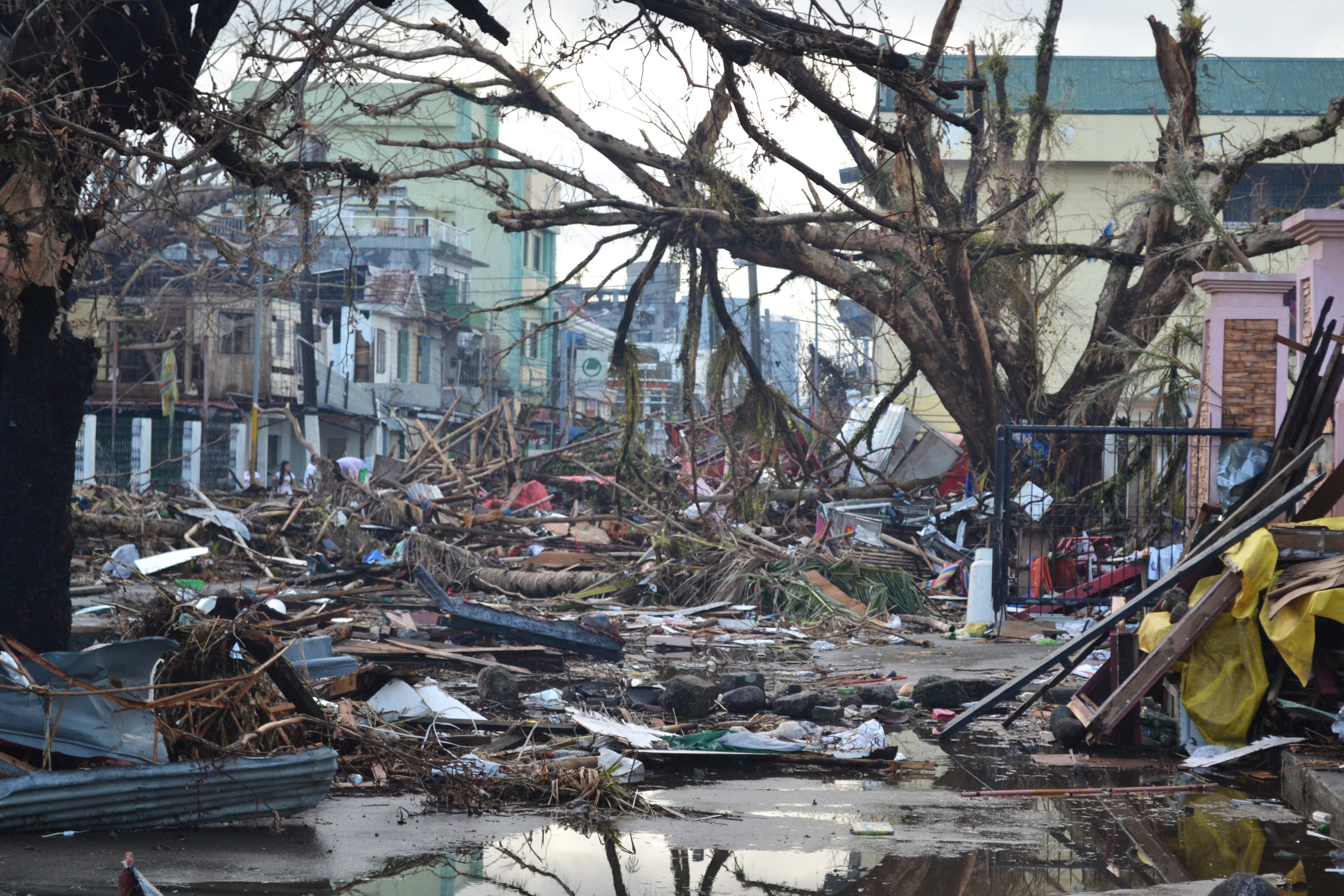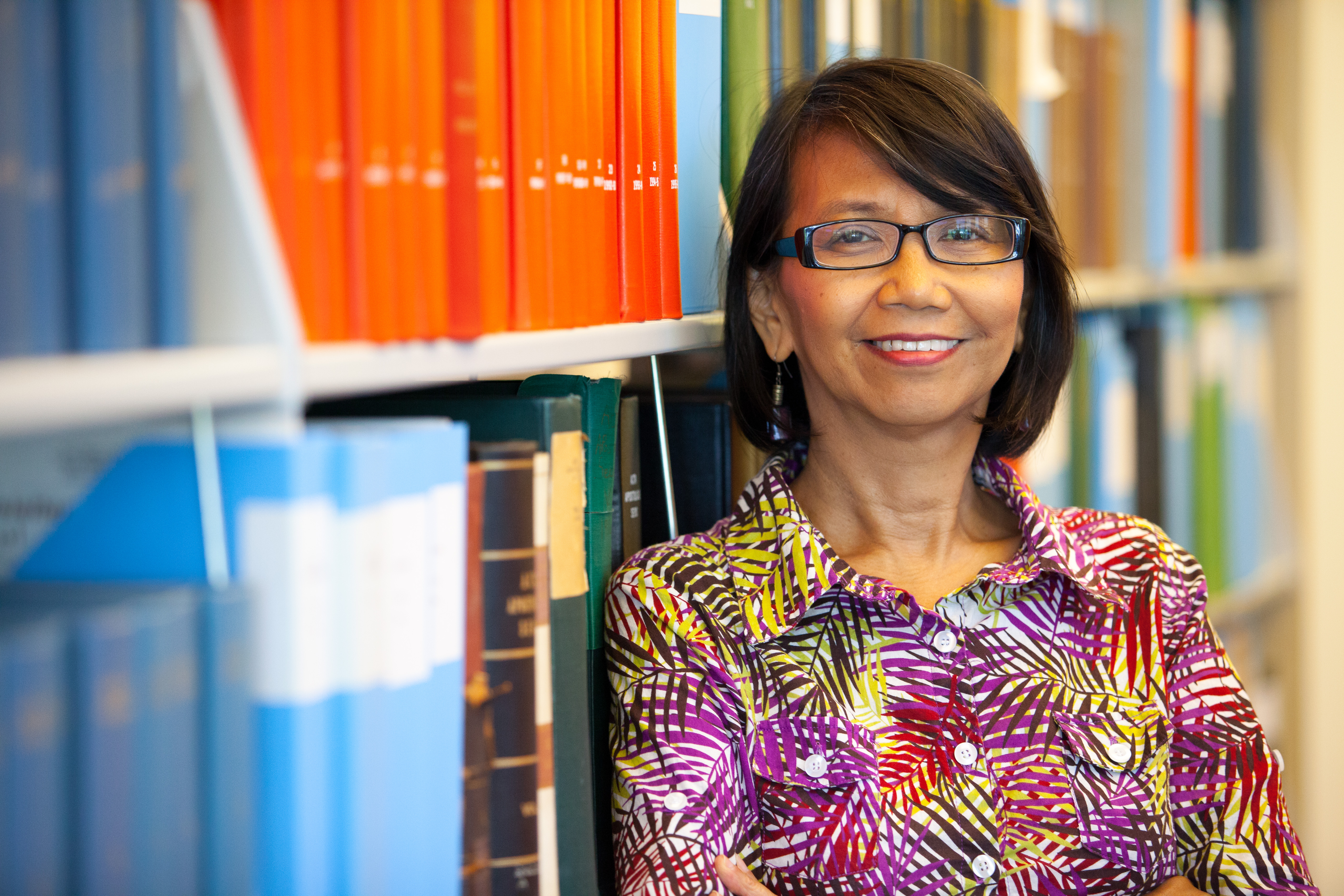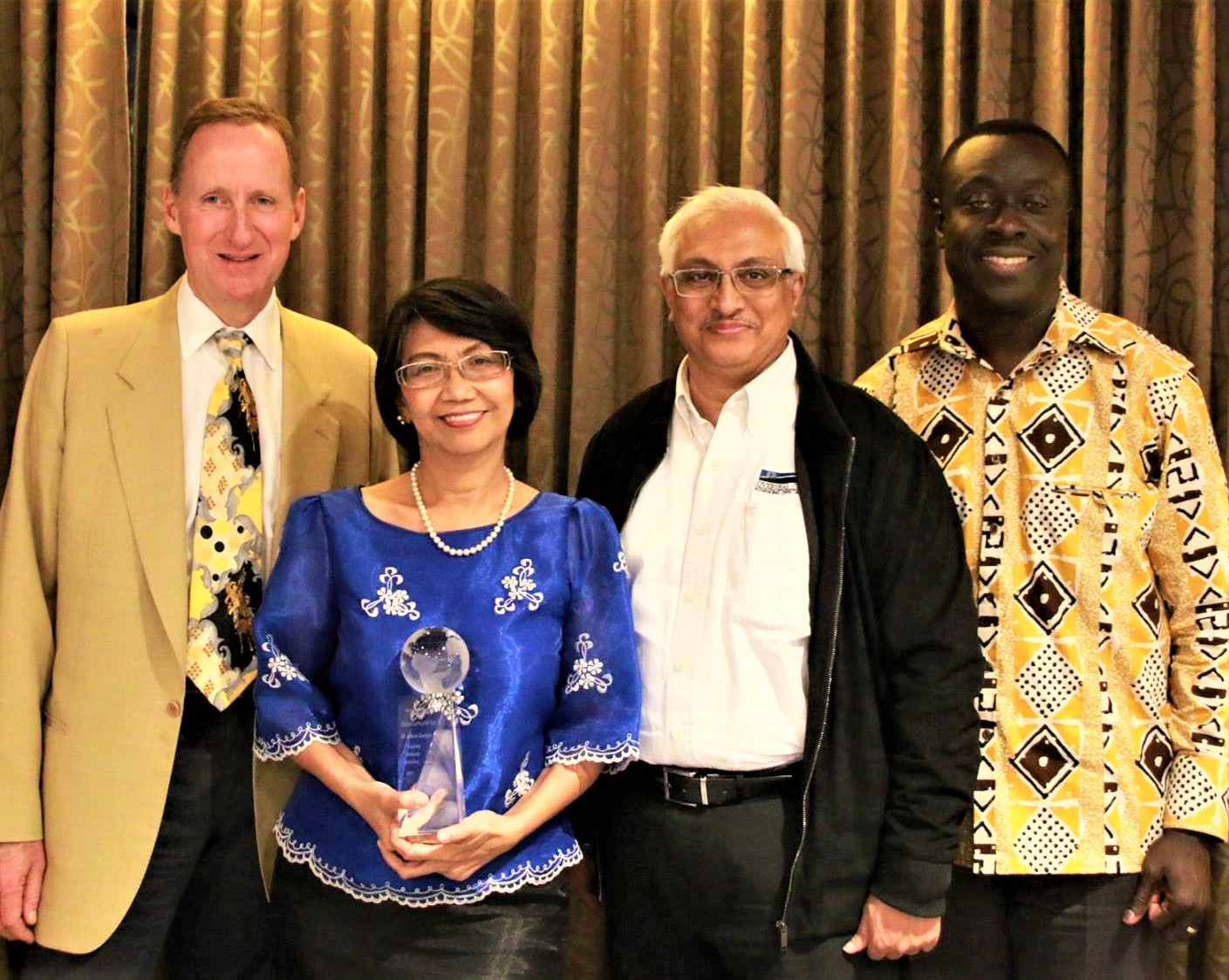Fifteen years ago, Langham Scholar Athena Gorospe gave a devotional in which she called her audience – wealthy American Christians – to be downwardly mobile. That morning in Pasadena, she argued that they should recover “Jesus’s concern for the marginalised, the invisible people.”
Athena has dedicated herself to this plea – and to practicing what she preaches – especially in the Philippines.
In November 2013, Typhoon Haiyan formed over the Pacific. It killed at least 6,300 people. Two months later, in January 2014, bodies were still washing ashore.

Typhoon Haiyan devastated the Philippines.
[Credit: Trocaire from Ireland – DSC_0974, CC BY 2.0]
Athena went on to write about how Christians should respond to disaster and about responsible environmental stewardship. But Filipinos also face longer-term, less obvious suffering.
Applying familiar Bible stories
Approximately 10.2 million Filipinos have left their homes to work abroad. As non-citizens, Overseas Filipino Workers (OFWs) have no legal recourse and often face humiliating prejudices. Yet they often make high salaries and adapt to their second countries’ cultures, which makes return difficult.
Athena applies familiar Biblical stories to help people understand OFWs. Talking about Moses’s flight from and return to Egypt at God’s command, she says that for migrants who return home, “There’s a… dying to certain things of a previous identity in order to be able to integrate into a new identity.” (You can read Athena’s essay on caring for OFWs here.)
Athena’s compassion for the marginalised also comes from personal experience. As an 11-year-old, she came to Christ in a Protestant church. She immediately used her own money to buy New Testaments for her classmates “because I wanted them to hear the Word of God.”

Marcos takes his second oath of office on December 30, 1969. Credit: Philippine Presidential Museum and Library (Wikipedia).
Her college years, however, were “the Marcos years,” years of dictatorship. “I was taking journalism, and my classmates were out [protesting],” she recalls, “but… I could not relate my faith with what was happening in society.”
This gap pushed her toward spiritual darkness. A mentor committed suicide; relationships failed. Remembering those years, she says, “Sometimes in my Christian community, you are affirmed if you are doing well, but if you fail… you get marginalised.” Eventually, she dropped out of school.
Grieving what she perceived as her failures, Athena read the Bible. She found the promise that God “is able to keep you from falling and to present you blameless before Him with great joy. I said, ‘I don’t feel that I’m blameless…,’ but there’s this promise!”
Encouragement for further studies
She was serving at a Filipino-Chinese church, but she felt that she needed training, so she finished her degree. She jokes, “Oh, I was trying to find the meaning of life, but I couldn’t… so I went back to school.”
She started studying at ATS. During a course on Christianity and society, a professor wrote on an exam, “I hope you would go for further studies, Lady Theologian.” With that encouragement, Athena earned her MDiv at ATS.

Athena entered Fuller Theological Seminary’s PhD programme in 2000 with support from Langham and ScholarLeaders.
When she finished, ATS invited her to earn a PhD and join the faculty. For decades, ATS had had only non-nationals as faculty. As Westerners retired, ATS began to hire Filipinos.
Athena said yes to ATS’s faculty development plan – “I really want to study God’s Word, and I really want to share God’s Word,” she remembers thinking – but she had to wait for more senior faculty to earn their degrees. ATS could not support most of its faculty leaving at once.
While she waited, Athena started teaching at ATS in 1993. In 2000, with support from Langham and ScholarLeaders, she entered Fuller Theological Seminary’s PhD program.
Working with people in the grassroots
Indeed, Athena still sees herself as speaking for the margins from the margins. “Not that I’m against ordination,” she notes, “but I never see myself as playing a role in the hierarchy.” Instead, she wants “always to be in the margins… working with people in the grassroots.”
Athena returned to ATS in 2006. She now directs ATS’s Contextual Theology PhD program, which is “an interdisciplinary PhD. Most people would just concentrate on Bible,” she says, but ATS integrates Theology with Social Sciences. Thus, Athena trains the next generation of Christian leaders to address societal questions.

OFWs in Vietnam greet Duterte on his first visit there in September 2016. Credit: PCOO EDP (Wikipedia).
Social problems have a distinct edge in the Philippines right now, so outside her academic work, Athena engages in activism. In June 2016, Rodrigo Duterte became president of the Philippines thanks to explosive anti-drug rhetoric. Some observers have even suggested that he encouraged ordinary people to kill anyone suspected of drug involvement.
Now, the situation is so drastic that “People… kill people and then wrap them in masking tape with a cardboard [sign] saying, ‘I’m a drug user.’ And that means that you’re worth being killed,” Athena explains. As of 2017, “7,000 people have died.” Athena and her colleagues have used social media, protests, and petitions to call for justice. (According to human rights groups, the number could be far higher.)
Attitudes to women
She also criticises Filipino attitudes toward women. With disgust, Athena says that “even the top leadership has made a lot of jokes about women.” When a Filipino congresswoman “launched an investigation on the extrajudicial killings… she became a target.” In order to discredit her, leaders “wanted to show her sex video in Congress!”
When Athena’s male students at ATS minimised the situation as “just a joke,” Athena turned to the Bible, to Judges 19, in which a woman is raped and hacked in pieces to make a political point. After reading that passage, her students “could hardly talk,” she recalls.

The Manila skyline.
Athena points out that this is one of the Bible’s primary functions: just as the prophet Nathan confronted David about Bathsheba, so Scripture forces us to look from problems “out there” to ourselves, to acknowledge that those problems are our own.
In such intense situations, Athena asks students, friends, colleagues – and her international community – to consider “how Scripture can speak to the issues of today.” She says that “Christians often have a naïve understanding of what goes on in society: ‘Just because I read it this way, then it is this way,’ when actually, there are other factors going on.”
Call for practical theology
To support her call for contextual, practical theology, Athena says, “Remember Job? The teaching of his friends was all right. They were orthodox…. Yes, … in some cases, if we sin, we do suffer the consequences…. But [for Job], it was the right doctrine to the wrong context.” She concludes, “the same message applied to the wrong context becomes a false message!”
Athena does see the Church growing in the Philippines. The country is 80% Catholic, thanks to about 500 years of Spanish rule, but Protestants are increasing (a significant Muslim minority lives in the south and has been in the news for the ISIS-driven siege of Marawi).
Partly thanks to emphasis within the Lausanne Movement on “social action and evangelism,” Athena is hopeful for the Church’s impact. Regarding poverty especially, she says, “I think we have matured so much in that area…. There are… ministries to children, ministries to women in prostitution.”
Athena’s own ministry ripples from ATS. For example, she has mentored “three generations” of women – Anawa, Georgie, and Jeannette. Athena mentored Anawa in her ministry to Iraqi refugees. Anawa encouraged Georgie to enroll at ATS. Together, they guided Jeannette, a recent ATS graduate, to participate in Wycliffe.

Athena with the ScholarLeader delegation at ATS.
In 2017, Athena received the ScholarLeader of the Year Award, in recognition of her dedication to theology and the marginalised. As part of that award, she will work with a leading school in Colombia, in March 2019, on the topics of women and violence. She notes, “It’s an opportunity for them to learn from me, and I’m also going to learn and listen.”
Whether she is counselling typhoon survivors, managing academic paperwork, protesting against extrajudicial violence, tweeting about women’s rights, or analysing the Old Testament, Athena calls us to consider how we will answer Christ’s challenge – “If you have done it to the least of these my siblings, you have done it to Me.”
This article is by Evelyn Reynolds, Director of Communications at ScholarLeaders International, and first appeared on the ScholarLeaders website. ScholarLeaders works with Langham to support a number of Scholars from the Majority World.
